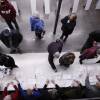At the Democracy Center in Cambridge, Julius Frost, a 21-year-old from Cedar Rapids, Iowa, stood in the middle of a sea of campaign signs taped to the wood-paneled walls. The excited voices of other voters rose around him.
While caucuses began to kick off back at home, Frost and 50 other Iowa voters gathered in a hot, crowded room in Harvard Square to make history by taking part in one of 92 "satellite" caucuses held around the globe on Monday.
In previous years, there was no way for Iowa residents to make an absentee vote, so Iowans who found themselves away from home during the caucus had no other option.
This year, for the first time, the Iowa Democratic Party authorized a series of remote caucuses around the world, from Scotland and Paris to Rhode Island and Massachusetts. The event kicked off at 8pm and finished about an hour and 15 minutes later, well before the caucuses in Iowa where there were lengthy delays. Democratic party officials in the Hawkeye State said the hold up was the result of a "reporting issue."
Though full results have yet to be declared, in Harvard Square, the tally was 22 votes for Sanders, which equated to three delegates. Twenty votes for Warren, which translated to two delegates, and one delegate for Buttigieg, who got eight votes.

Frost, a junior at Boston University, says he heard about the satellite caucus from an Andrew Yang political group online.
“Before this, I was actually pretty discouraged,” Frost said, “I thought I couldn't actually caucus because historically, we've never had one of these.”
Before the caucus began, Frost said he felt “hyped up” and encouraged. By the second alignment, or round of voting, Frost looked a bit lost. Yang had only drummed up three votes, which wasn’t enough to become a “viable” candidate and stay in the race.
By caucus half-time, the two Joe Biden supporters had moved across the room to join the Pete Buttigieg crowd, giving the former mayor the minimum to get a delegate. The Bernie Sanders group had 20, and Elizabeth Warren’s group was tallying at 19. This meant the three voters who had chosen Andrew Yang and the one Amy Klobuchar supporter had a choice to make: Pick another candidate, or throw away your vote.
While voters from the Sanders and Warren groups moved around the room, actively wooing the undecided parties, Steven Drew, a resident of Coralville, Iowa, excitedly stage-whispered his predictions from the Buttigieg corner of the room. “Eight is equal to one, and there’s actually one more half-delegate,” he said. “If Warren doesn’t pull more people in right now, they’re not going to get the extra delegate. But I’m not going to go tell them that.”
Amid the chaos, Massachusetts resident Hamzah Raza poked his head out of the “observers” room, where a group of non-Iowans had come to witness history and try to understand caucus math for the first time.
“I never thought I would see an Iowa Democratic caucus,” Raza said. “I wanted to see it in real life. It feels like the primaries have started now.”
Grey Black, a 26-year-old Brighton resident, had also never witnessed a caucus before, and said he hadn’t even heard of it until a few months ago, when he started volunteering on the Yang campaign.
“I see why it's not super commonplace. It's super hard if you're working or if you have kids. There are a lot of things that make it difficult to participate in the process,” Black said. “But I like the fact that it encourages enthusiasm as a means of garnering support. You can kind of pep up and talk up your candidate to bring other people over who might be on the fence when they show up.”

Eventually, one Yang voter had gone with Bernie, the other with Warren.
Frost, looking crestfallen, had chosen to stick with Yang.
“I just wanted to show as much strength left in Yang as possible,” Frost said. “I’ve looked at all of the candidates and really there was no other option for me.”
Other voters didn’t have to compromise. Jackson Brown, a 19-year-old junior from Boston University, came in supporting Sanders, who won the night — at least in Harvard Square.
Brown, a Fairfield, Iowa resident, said being an Iowa voter is a lot of responsibility, especially for someone caucusing for the first time. “It’s really scary, because two years ago, I had to ask to go to the bathroom,” Brown said. “Now I'm deciding the fate of the country and the world. It puts a lot of weight on my shoulders.”
Brown says he was happy to participate this year, though he thinks caucusing in general is “probably less effective” than a standard ballot procedure.
“It's weird, and I don't understand why it's still done,” Brown said. “I'm sure there's a great reason. I just don't know what it is.”
Steven Drew, who left as one of the eight people who guaranteed a single delegate for Buttigieg, was satisfied with the process.
“It was perfectly Iowan,” Drew said. “It was unrehearsed, and simple ... but it got the job done.”
The Associated Press contributed to this report.








